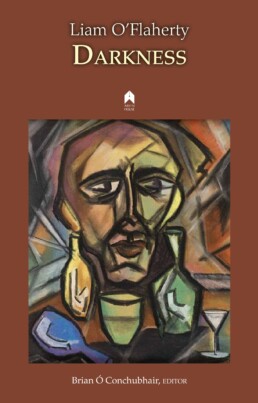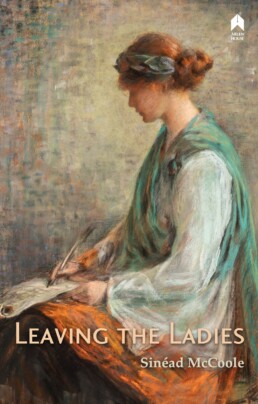Tearing Stripes Off Zebras
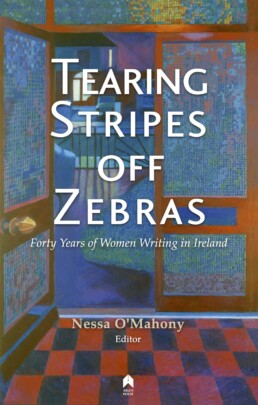
Nessa O’Mahony, editor
Tearing Stripes of Zebras
of Women Writing in Ireland
9781851323005 paperback, €20
9781851323104 limited edition hardback, €50
Tearing Stripes off Zebras is an anthology of new literary writing by thirty-three women who, at one time or another, have participated in the WEB writers’ group which emerged in the mid-1980s after some contributors attended workshops organised by the Women’s Education Bureau (WEB), the national association of Irish women writers. WEB was the brainchild of Arlen House founder Catherine Rose, who appointed poet Eavan Boland as Creative Director.
As an editor at Arlen House from 1978, Boland did much extraordinary work to develop, mentor and promote Irish women writers. The founders of WEB writers’ group initially met at these empowering, transformative workshops, and they have been meeting continuously for almost forty years, making WEB one of the longest-running writing groups in Ireland. Over the decades, WEB writers and alumni have established highly successful literary careers, publishing books, having plays and film scripts produced, and winning prestigious literary prizes.
This anthology of new poetry, prose and drama, edited by Nessa O’Mahony, is dedicated to the memory of Eavan Boland.
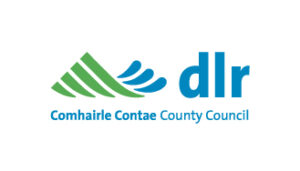

Darkness
Long lost play with critical introduction by Notre Dame scholar. Recently discovered in America, Dorchadas is the long-lost text of Liam O’Flaherty’s three act tragedy staged in the Abbey Theatre in 1926. This edition contains the text, and a detailed account of the controversies surrounding the play’s origins, production and reception at the Abbey in 1926. Liam O’Flaherty is one of the most important and internationally celebrated Irish writers of the twentieth century.
Gondla, or The Salvation of the Wolves
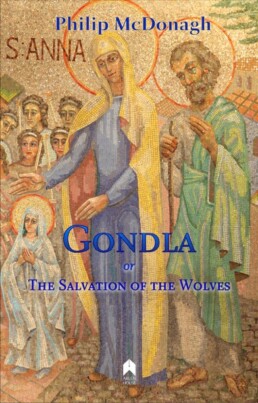
Philip McDonagh
Gondla, or The Salvation of the Wolves
ISBN:
9781851321261
9781851321469 limited edition
Gondla is rich in Irish themes. The play’s visionary poet-king is based on a legend re-told by Lady Gregory. The events of 1916 are in the background. The style of the play and its legendary setting are strongly influenced by W.B. Yeats.
Nikolay Gumilyov was executed by the Bolshevik regime in 1921, one year after the production of Gondla. Gondla can be read as the testament of an extraordinary group of writers: Gumilyov, his estranged wife Akhmatova, and their dear friend Osip Mandelstam. It is also an allegory of the state of Europe in the 20th century.
The present translation of Gumilyov’s play is by the poet Philip McDonagh, a former ambassador of Ireland to the Russian Federation.
Crime and Punishment
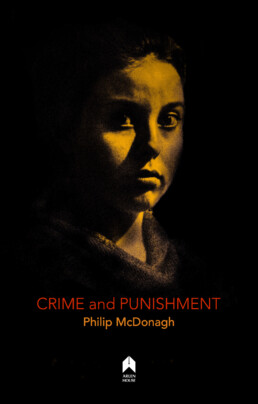
Philip McDonagh
Crime and Punishment
ISBN: 9781851321353
National tour by Morgan Creative in 2017 in Druid Theatre, The Complex Dublin, Kino Theater Hastings UK, Station House Theatre Clifden, The Courthouse Oughterard.
The Russian masterpiece by Fyodor Dostoyevsky is adapted for the stage by Irish playwright Philip McDonagh. Stunningly illustrated, the book also includes a perceptive introduction by Mary McAleese, former president of Ireland.
It’s set in St Petersburg, Russia, in 1865 where a young man commits a violent, cold-blooded murder. He considers himself a Napoleon, acting for a higher purpose. But as he’s gradually confronted with the seriousness of his crime, only the downtrodden prostitute, Sonja, can offer him a chance at redemption. Dostoyevsky, a novelist, playwright, short-story writer and essayist, is regarded by literary critics as one of the greatest psychologists in world literature and Crime and Punishment is one of his finest works.
Leaving the Ladies
Leaving the Ladies is a play based on an actual event which took place on 11 December 1917 in the bathroom beside the Round Room in the Mansion House. This was no chance meeting of a group of ladies in the lavatory. Instead it was an organised and minuted meeting of Women Delegates to the All Ireland Conference, attended by some of the most important and influential women of the day; Dr Kathleen Lynn, Rosamond Jacob, Dulcibella Barton, Mary Perolz, Alice Ginnell, Margaret Kennedy and Constance de Markievicz.
Leaving the Ladies had a full reading in period costume in the National Library of Ireland in 2019 performed by Smashing Times Theatre Company directed by Mary Moynihan
Dr Sinéad McCoole is a specialist in modern Irish history, focusing on the role of women in the late 19th and 20th century.
Smidhead / Makeup
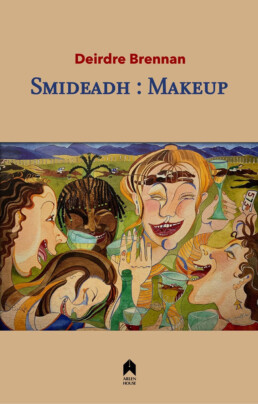
Deirdre Brennan
Smidhead / Makeup
ISBN: 9781851322619
Candy: Tá brón orm. Níl a fhios agam cad a tharla dom. I sárdhomhan b’fhearr liom bheith im bhanréalta scannán ag caitheamh éadaí grástúla nó bheith im thiománaí i rásanna Formula a haon. Nílim ag rá gur míbhuntáiste é bheith mar atáim ach nach mbímid go léir i gcónaí ar thóir súilíní. Bím uaigneach ó am go ham in ainneoin bhur gcairdis. Is aoibhinn liom siopadóireacht is ba bhreá liom lingerie a cheannach go hoscailte gan bheith ag breathnú thar mo ghualainn. Na rudaí go léir, a nglacann sibh leo go nádúrtha, ní mar an gcéanna dom. I sárdhomhan bheinn níos mó ar mo shuaimhneas liom féin. Ar an lámh eile dá gcloisfeadh sibh mo phearóid nuair a bhím gléasta suas chun dul amach oícheanta agus an fheadaíl a bhíonn ar siúl aici! Tá sí chomh greannmhar. I láthair na huaire táim ag múineadh Gaeilge di trí mheán na foghraíochta.
It’s ok, honey. I’m sorry. Don’t know what got into me. To answer your question, in a super world, I would choose to be born a fully-female being. That’s to say I wouldn’t have a shadow of male hormones hovering in my body. Not that it’s any disadvantage being as I am, but you girls know that I’m often lonely in spite of your friendship. I could shop wherever I liked, buy lingerie without looking over my shoulder. Do all the things you take for granted. In an ideal world I’d be more at ease with myself. And girls, if you could only hear my parrot when I’m dressed for an evening out. His cat whistles after me are a riot. Currently I’m teaching him the bit of Gaeilge phonetically.
Reading the Future: New Writing from Ireland
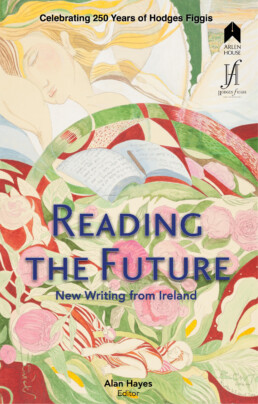
Alan Hayes (ed.)
Reading the Future: New Writing from Ireland
ISBN :9781851322015
Available from
Reading the Future: New Writing from Ireland celebrates 250 years of Hodges Figgis bookshop with new work from 250 of Ireland’s finest writers. The anthology encompasses poetry, short fiction, drama, novel extracts, crime, Irish language and children’s writing – giving us a showcase of the phenomenal talent which exists in Ireland today.
Hodges Figgis, one of the oldest bookshops in the world, traces its beginnings to 1768, when John Milliken opened a bookshop on Skinner’s Row. In 1844 Hodges Smith & Co. bought the business, and Samuel Figgis joined the firm, leading to the Hodges Figgis relationship being formed. Over the centuries the firm moved to Grafton Street and Nassau Street, and even opened up branches around the country. The shop took up residence in Dawson Street in 1945 where it thrives today as part of the Waterstones group. Hodges Figgis has been immortalised internationally in James Joyce’s Ulysses. This rich literary tradition continues with Reading the Future: New Writing from Ireland.
The McGowan Trilogy
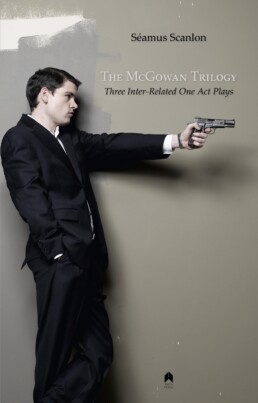
Séamus Scanlon
The McGowan Trilogy: Three Inter-Related One Act Plays
ISBN: 9781851321117
Available from
Praise for The McGowan Trilogy
Many have written about the situation in the North of Ireland – few with such gusto and attention to detailed violence as Scanlon. There are shades of Joe Orton and Martin McDonagh in these plays but Scanlon ploughs his own bloody, uproarious furrow.
– Larry Kirwan (Hard Times), black47.com
The McGowan Trilogy is a superb achievement. Addictive in its telling, the 3 sections come together to plot points on a map that is part a man’s soul and part a hell of his own creation. Wonderfully done by Scanlon, The McGowan Trilogy opens a pandora’s box of ambition and regret, and leaves the viewer haunted.
– Urban Waite (Sometimes the Wolf), urbanwaite.com
The McGowan Trilogy tells the story of psychopath, street–wise philosopher and executioner, Victor McGowan, and those unfortunates who come within his orbit. O’Casey meets Behan, both on LSD with a little bit of Guests of the Nation thrown-in. Incisive wit, gallows humor and intelligent one-liners. Powerful and original, right to the last.
– Sam Millar (On the Brinks), millarcrime.com
What a delight for fans of Scanlon’s terrific noir fiction to see him put his verbal virtuosity and storytelling flair to theatrical use! With its crackling dialogue and bravura blend of black comedy and unnerving violence, The McGowan Trilogy shares some dramatic DNA with the work of both Martin McDonagh and Quentin Tarantino. It possesses, however, an emotional, often poetic, power all its own.
– Harold Schechter (The Mad Sculptor), haroldschechter.com
Séamus Scanlon’s The McGowan Trilogy, set on both sides of the porous Irish border during the ‘troubles’ of the 1980s, is internecine both in the modern sense (relating to internal struggles) as well as the word’s original meaning (fought all the way to the death). Scanlon’s literate theatricality is devastating but irresistible.
– James L. de Jongh (Vicious Modernism)
Victor McGowan in The McGowan Trilogy is a charming psycho, the bastard child of Samuel Beckett and Quentin Tarantino.
– Al Guthrie (The Abandoned), www.allanguthrie.co.uk
The McGowan Trilogy is filled with music and murder, melancholy and regret. Victor McGowan, Scanlon’s protagonist, demonstrates the chilling way that – in John Cale’s immortal words – ‘the waster and the wasted get to look like one another in the end’. Strong stuff, dark and bitter as the past.
– Joseph Goodrich (The Red Box), playscripts.com/playwrights
The McGowan Trilogy is heart-stoppingly dark and gloriously poetic.
– SJ Rozan (Ghost Hero), sjrozan.net
Scanlon is a bloody fine storyteller and a truly imposing writer. Dancing at Lunacy’s fierce and unflinching combination of tragedy, absurdity and wit set him apart.
– Peter A. Quinn (Dry Bones), newyorkpaddy.com
Dancing at Lunacy is a sharp, super-charged punk-rock driven IRA drama that is dark, chaotic, button-pushing and resonant. Scanlon’s dialogue combines nasty wit, poetry and blasphemy.
– Jonathan Santlofer (The Death Artist), jonathansantlofer.com
A trio of plays that begins with comedy and irreverence and ends with pathos and loss, Séamus Scanlon’s The McGowan Trilogy is surprising, original and hugely enjoyable.
– Christian O’Reilly (Chapatti), theagency.co.uk
Dancing at Lunacy is psychotic vaudeville from the pen of a punk rock Pinter, a gory, hilarious fairground ride to the dark side
– Paul Duane (Barbaric Genius), www.screenworks.ie
Duilleoga Tae
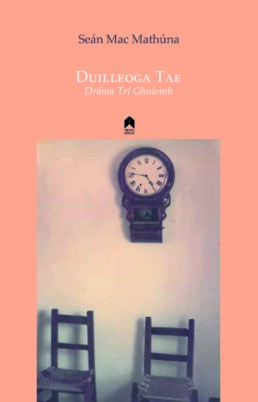
Seán Mac Mathúna
Duilleoga Tae
ISBN:
9781851321292
Baineann Duilleoga Tae le laethanta deireanacha Chogadh na gCarad i gCiarraí idir sléacht Bhaile Ó Síoda i Márta na bliana 1923 agus forógra Frank Aiken ag deireadh na Bealtaine 1923. Ag croílár an dráma seo tá dhá chogadh ar siúl: ag an macraileibhéal, tá Cogadh na gCarad ina bhfuil dhá ghrúpa pholaitiúla ag iarraidh a dtoil pholaitiúil agus a mian idé-eolaíochta a chur i bhfeidhm. Ag an micrileibhéal, tá na carachtair ag déanamh a ndíchill a dtoil phearsanta féin a chur i bhfeidhm ar charachtair eile. Ní ceiliúradh ar chogadh ná ar fhoréigean é an dráma seo, áfach, ach léiriú ar choimhlint ghnáthdhaoine a gortaíodh agus a gcaitear go dona leo agus na hiarrachtaí a dhéanann siad agus na straitéisí a úsáideann siad chun buachan i ngnáthchogadh an tsaoil. Ag croílár an dráma seo, tá gnáthfhadhbanna gnáthdhaoine seachas imeachtaí móra na staire
– Brian Ó Conchubhair, University of Notre Dame
Plight / Cruachás
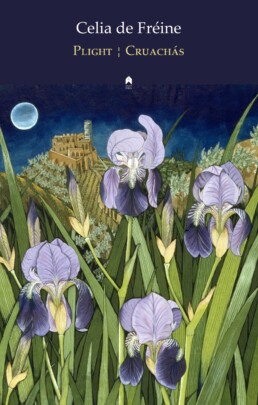
Celia de Fréine
Plight / Cruachás
ISBN:
9781851320592 hardback
9781851320608 paperback
Were The Midnight Court to be reconvened in this day and age, what problems would be up for discussion? What are the sexual mores that cry out for assessment by an otherworld force? This contemporary Aisling imagines an ancient but recently-discovered tribe, living on the margins of Irish society, who practise their own customs and in so doing ignore at times the rules of the country in which they are living. In trying to protect their younger generation from a society they deem out of control, parents encourage their offspring to marry within the tribe while still in their teens. The problems faced by such young people, were such a tribe to exist, are explored in this play.
Dá n-ationólfaí Cúirt an Mheán Oíche san am i láthair, céard iad na fadhbanna a bheadh le plé inti? Céard iad na nósanna gnéasacha gur chóir a mheas ag fórsa neamhshaolta? San aisling chomhaimseartha seo samhlaítear treibh ársa, a dtángthas orthu le deireanaí, a bhfuil cónaí orthu ar imeall na sochaí Éireannaí, a chleachtann a ndeasghnátha féin agus, dá réir sin, a dhéanann beagchúram de rialacha na tíre ina bhfuil cónaí orthu. Ag féachaint lena glúin óg a chosaint ó shochaí atá imithe ó smacht, dar leo, spreagann tuismitheoirí a sliocht chun pósadh laistigh den treibh agus iad fós sna déaga. Iniúchann an dráma seo na fadhbanna a mbeadh ar a leithéid d’óige aghaidh a thabhairt orthu, dá mba ann dá leithéid de threibh.
Celia de Fréine is a poet, playwright, screenwriter and librettist who writes in Irish and English. Among her collections of poetry are: Faoi Chabáistí is Ríonacha (2001) and Fiacha Fola (2004) from Cló Iar-Chonnachta; Scarecrows at Newtownards (Scotus Press, 2005); imram ¦ odyssey (2010) and Aibitír Aoise ¦ Alphabet of An Age (2011) from Arlen House. Her poetry has won many awards including the Patrick Kavanagh Award (1994) and Gradam Litríochta Chló Iar-Chonnachta (2004). She has four times won Duais an Oireachtais for best full-length play. Arlen House published three of these plays in Mná Dána (2009). In the same year the Abbey Theatre presented a rehearsed reading of her play Casadh which it had commissioned. The short films Lorg, Seal and Cluiche, inspired by her poems, have been shown in festivals in Ireland and the US. In association with Biju Viswanath, she wrote the film Marathon which won best screenplay award at the New York International Film Festival in 2009. Also in 2009 Living Opera, in association with Opera Ireland, presented a showcase performance of the opera The Earl of Kildare, composed by Fergus Johnston, for which she wrote the libretto. Further information: www.celiadefreine.com
Is file, drámadóir, scriptscríbhneoir agus leabhrógaí í Celia de Fréine. Tá cúig leabhar filíochta i gcló aici: Faoi Chabáistí is Ríonacha (2001) agus Fiacha Fola (2004) ó Chló Iar-Chonnachta, Scarecrows at Newtownards (Scotus Press, 2005); imram ¦ odyssey (2010) agus Aibitír Aoise ¦ Alphabet of An Age (2011) ó Arlen House. I measc na ngradam liteartha atá buaite aici dá cuid filíochta tá Duais Patrick Kavanagh (1994) agus Gradam Litríochta Chló Iar-Chonnachta (2004). Bhain sí Duais an Oireachtais do dhráma ilghníomh ceithre huaire. D’fhoilsigh Arlen House trí cinn de na drámaí seo in Mná Dána i 2009. Sa bhliain chéanna chuir Amharclann na Mainistreach i láthair léiriú cleachta den dráma Casadh a coimisiúnaíodh uaithi. Taispeánadh na gearrscannáin Lorg, Seal agus Cluiche, bunaithe ar dhánta léi, i bhféilte in Éirinn agus i Meiriceá i 2007 agus 2008. I gcomhar le Biju Viswanath scríobh sí an scannán Marathon a bhain an duais don script is fearr ag Féile Idirnáisiúnta Scannán Nua-Eabhrac i 2009. Sa bhliain 2009 léirigh Living Opera, i gcomhar le Opera Ireland, taispeántas den cheoldráma The Earl of Kildare, cumtha ag Fergus Johnston, ar scríobh sí an leabhróg dó. Tuilleadh eolais: www.celiadefreine.com

